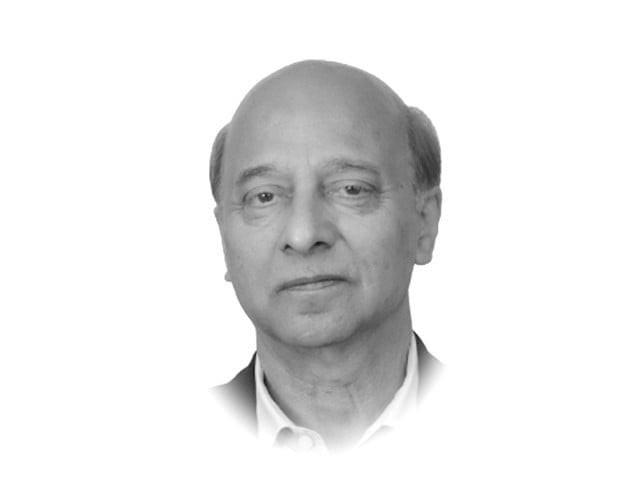Whimsical decisions, expediency and extrajudicial murders

Regardless of the motives, the decision on Operation Azm-e-Pakistan betrays the whimsical nature of decision-making in the country. Decisions lack consideration for their potential strategic fallout. The fierce reaction from Khyber-Pakhtunkhwa and Balochistan to Azm-e-Pakistan is a case in point. Not enough thought, it seems, went into possible questions around such an undertaking.
That is why the reactions pushed the government into defensive explanations which only smacked of attempts to save itself further embarrassment in the face of noises from the provinces worst affected by years of war and conflict.
The hype and the ensuing standing down by the authorities merit a few critical questions.
Firstly, why beat drums about the anti-terror drive? Isn’t it meanwhile a permanent element in the civil-military security forces’ role to guard against criminals and anti-state elements? This is something self-understood at least since the Al-Mizan operation launched jointly by the United States and Pakistan in 2002 to combat al-Qaeda, Taliban and other foreign terrorist organisations hiding in Waziristan after fleeing the US/NATO troops from Afghanistan. Why drum up?
Secondly, will rebranding of civil-military security forces’ primary task achieve the stated desired objectives? It succeeds over half a dozen similar undertakings since 2007 — when the Pakistan Army launched the Operation Sherdil in Bajaur in synch with the US-NATO led Operation Lion’s Heart in the Kunar province in Afghanistan.
This was a sequel to Al-Mizan, and was followed by Rah-e-Nijat, Rah-e-Raast, Zarb-e-Azb and Radd-ul-Fasaad. The stated objectives of all these operations hardly differentiated one from the other i.e. drive against criminals and terrorists. Every campaign accompanied claims that “the back of terrorists and criminals” has been broken. Why then come up with a new brand?
Thirdly, does a military operation serve as a dam against mob justice and extremism? Can political bravado quell the tendency to violent actions by individuals? Does it address the causes that negatively impact young minds?
Fourth, how effectively can armed campaigns against criminals and terrorists sensitise the local administrations to strictly enforce the existing laws to curb extremist violence? What can such a campaign achieve when police and other civilian law enforcement agencies cannot enforce the Loudspeaker Act even in the capital Islamabad?
Fifth, why is Mulla free to propagate his ideology and uses the pulpit and the loudspeaker of the mosque to incite people to go after alleged “blasphemers”? The calls that led to the lynching of the Sialkot tourist in Swat were issued via the mosque loudspeaker.
Sixth, have successive military operations been able to stop proliferation of illegal mosques and madrassas on public and private property? Certainly not because most are run by religio-political parties such as the JUI and JI. Governments — both military and civilian — have often tended to pander to these parties for votes and thus refrained from action against the clerics associated with these parties.
Seventh, are we clear about the nature of the threat? Is it genuine local terrorism or externally-driven proxy terrorism? No anti-terror drive is likely to succeed until clarity about the nature of the enemy.
Eighth, are we clear on what constitutes a bigger threat — proxy terrorism or internal intolerance and extremism that thrives off a deficient and leaking criminal justice system? At least three blasphemy-related murders this year, extremely indecent exchanges among political rivals and the continued charade of allegations and innuendos focused on Imran Khan and his party hardly give any reason for optimism. No hard force can root out such deeply entrenched behaviours — even among the elected notables.
Nine, the 18th constitutional amendment bars — constitutionally — any federal security or administrative action in provinces. In the absence of a consultative process with the provincial government and the parliament, such actions will kick up more controversies and entail adverse reactions than achieve stated objectives of the federal forces.
The latest wave of furious reactions to Azm-e-Pakistan from Balochistan and Khyber-Pakhtunkhwa once again highlighted the need for the consultative process with provinces.
Lastly, counter-terrorism measures will remain ad hoc until there is clarity on the nature and scope of threat. Their lasting success will depend only on the exercise and proliferation of the state soft power i.e. enforcement of the law at all levels.
Civil and military bureaucrats are constitutionally bound to exercise their powers against terrorists and criminals — regardless of the latter’s political connections. Bureaucrats and politicians love to harp on “national narrative” for peace but they must realise that narratives are not cooked up with the help of assumed ingredients. The situation on ground — adherence to law, indiscriminate implementation of law — generates a pro-state narrative and not cocky colourful presentations. People need to see to believe the state’s commitment to justice.
Unless the governance regime rests on conclusive action without political consideration or intervention, no hard power exercise or military operations will rid the society of the prevailing threats.















COMMENTS
Comments are moderated and generally will be posted if they are on-topic and not abusive.
For more information, please see our Comments FAQ